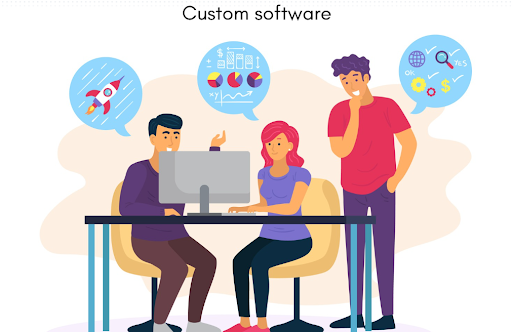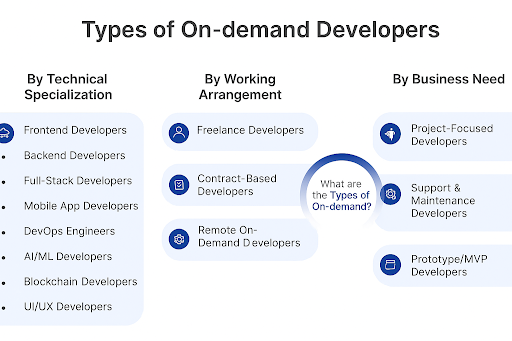Why You Should Hire On-Demand Developers in 2025
The past few decades have been a success for the tech industry as a whole, as companies continue to build business models that require them to have high-quality development capabilities to run their business day-to-day. Developers are now a core part of any modern organization, and there is a Developer behind the screen of every app or program we use daily across any area of technology, whether it is backend or frontend development, Android, or iOS mobile app development company. However, one Developer won't be able to handle all these technologies, let alone architect them for use today in a multi-faceted digital ecosystem.
At tech companies today, we see deep, detailed knowledge and thought in a very specific area of a tech stack. The stack could be building backend logic, UI/UX expertise, or mobile apps, where storing data in apps must be reliable and with high performance. For example, poor implementation can lead to performance issues, poor security, or add vulnerabilities, and in many cases, data breaches can be a critical issue.
This is where hiring on-demand developers can have a huge impact on your organization. By utilizing highly qualified specialists on a flexible and as-needed basis, companies can fill in key skill gaps, scale teams rapidly, and improve the speed at which products are delivered. If your company requires ongoing support, specialized temporary work, or immediate assistance, on-demand developers can provide the capabilities you need when you need them. The work they produce can enhance project delivery speed, reduce your overall costs, and help you through challenging development timelines.
Many more companies are electing to hire on-demand developers as a way of remaining responsive and competitive in an ever-changing technology landscape. This model provides unparalleled flexibility for organizations by allowing them to respond to shifting challenges without significant or fixed costs quickly. Whether you are a startup or enterprise, the decision to hire on-demand developers can be the difference between a project falling off the rails and remaining on track and integrated with your overall business plan.
In this blog, we will discuss what is hire on-demand developers entails, the benefits, and things to consider before determining that it's the right path for your organization.

Looking to Fill Skill Gaps Quickly?
Hire niche experts on-demand to strengthen your dev team instantly—no long hiring cycles required.
What is an on-demand developer?
An on-demand developer in the software world typically refers to a Custom software professional who is hired on some flexibly-defined basis—often as a short-term or project-based contractor—instead of as a full-time employee. On-demand developers are often used by businesses when they are in need of specific technical skills, when they want to complete projects as quickly as possible, or when they want to supplement current technical efforts without incurring the full cost of hiring new employees. This industrial model allows companies to easily scale teams to meet changing project scopes or accommodate sudden spikes in project/rollout workload. Immediately on-demand developers provide value when they each fill critical skill gaps, and keep projects on schedule.
On-demand software developers typically provide the following features:
- Hired for short-term, part-time, or project work
- Provide specialized skills in refinements for frontend, backend, mobile, or cloud
- Reduced cost of hiring and timing of full-time hiring
- Have fast onboarding and impact
- Help scale teams quickly when there are high demands
- Good model for tech start-ups, agencies, and product teams that are fast-moving

What are the Types of on-demand developers
Frontend Developers
Developer user interfaces(UI) using Basic HTML, CSS, JavaScript, and frameworks like React, AngularJS, or VueJS.
Backend Developers
Focused on server-side logic, APIs, and databases using technologies like NodeJS, Hire Python Developers, Java, Ruby, or PHP.
Full-Stack Developers
Practiced in both front and back-end development and can deliver on a project's needs from end-to-end.
Mobile App Developers
Developers focus on iOS (Swift, Objective-C), Android (Kotlin, Hire Java Developers), or cross-platform development (Flutter, React Native).
DevOps Engineers
Manage infrastructure, CI/CD pipelines, deploy to the cloud (AWS, Azure Devops, GCP), and monitor/maintain systems.
AI/ML Developers
Fundamentals include machine learning models, data, and AI-powered applications that may include technologies like Python, TensorFlow, PyTorch, etc.
Blockchain Developers
Build decentralized apps (dApps), write smart contracts, and crypto integrations using technologies like Solidity, Ethereum, etc.
UI/UX Developers
Design systems and front-end code to provide seamless and visually beautiful interfaces.
Freelance Developers
Working on a contract per project or hourly based, usually found on freelance platforms, these independent professionals are working independently of a project team.
Contract-Based Developers
Developers hired through an agency or staffing firm, for a short-term or fixed duration, to work within a client development team.
Remote On-Demand Developers
Developers who are not located on-site. Providing development services as needed.
In-House, Temporary Developers
As a category, in-house temporary developers may or may not have been hired on a full-time basis. They are focused on-site for a determined timeframe, such as a week, usually for projects that require a lot of collaboration (e.g., team stand-ups, collaborative meetings) or for projects with security constraints.
Project-Focused Developers
Project-focused developers will be scoped for a specific activity with established timeframes and timelines expected.
Support & Maintenance Developers
Support & maintenance developers typically have goals such as supporting the team, fixing bugs, improving performance, and advancing the system.
Prototype/MVP Developers
Prototype/MVP developers will generally support your initiatives to build the early-stage version(s) of your product to validate concepts or present products to investors.
Also Read:
How much does it cost to hire AI Developers
Save on Hiring & Infrastructure Costs
Get the flexibility of scaling up or down, only paying for the work you need—without overheads.
In what ways can on-demand developers help solve your problems?
Current tech stacks are incredibly specific—no one developer can be skilled in all of them. Your in-house team could be virtually experts at backend but could have little to no knowledge when it comes to mobile or cloud.
Solution: When you hire developers on demand, you will find experts in niche areas such as Hire React Native Developers, AWS, or Python for AI, allowing you to close critical skill gaps without hiring for the long term.
Example: A startup that combines Machine Learning with Artificial Intelligence (AI) can hire on-demand developers who are versed in ML to develop a recommendation engine to be incorporated into the product.
2. Quickening Project Delivery
Time-to-market is a very real pressure. Hiring people to fill out your team creates delays and slows progress.
Solution: Developers on demand allow you to quickly add to your team, and subsequently expedite project delivery without long hiring processes.
Example: A company is behind on a product launch and interacts with three on-demand developers for a short contract period, meets the product launch timelines while not overly using internal walls of expertise.
3. Can lower hiring and operational costs
Hiring developers to fill full-time positions is costly—the salary, the benefits, office space, etc.
Solution: Using an on-demand app development company allows you to tap into an expert talent pool for a fraction of the cost; you will only pay for what you use.
Example: A small business required a mobile update and worked with an on-demand mobile app development company to get the job done in two weeks.
4. Allow for peak workloadsYou may have more development work during product launches or seasonally focused work.
Solution: A remote development team or the ability to bring on one-off developers, on-demand, to help with the peak will reduce the development workload for your core team.
Example: An e-commerce company hired developers on demand to launch new features and enhance the customer experience during peak holiday season.
5. Flexibility with scope creep
Projects often need to pivot in the middle of a development cycle that requires new skill sets or simply adds capacity to a team.
Solution: On-demand app development services provide a way for companies to pivot and adjust their team size up or down according to their business needs, easily.
Example: A client wants to have a mobile version of an app you are developing, but the original project was scoped for a web app only. Immediately, the team takes on on-demand developers who are skilled using React Native to start the mobile version.
6. Handling Maintenance & SupportMany times, core teams are busy innovating, and maintenance falls behind.
Solution: You can hire developers on demand to complete patches, monitor performance, and keep systems healthy, without shifting focus away from what makes your company unique.
Example: A SaaS company engaged on-demand development teams that focused on updating a company's backend and health checking the server.
7. Rapid Prototyping or MVP Development
Time is of the essence when you are testing new ideas.
Solution: Accessing an on-demand application development approach allows you to create MVPs quickly, validate market fit, and ensure you are not committing resources unnecessarily while spending a reasonable amount to qualify a decision.
Example: A start-up entrepreneur hired an on-demand app development company and developed a working MVP in less than a month.
8. Gaining Access to Specialized Skill Sets
New technology, such as blockchain or AI, demands niche specialists.
Solution: On-demand mobile app development companies provide required access to specialists for one-off, short-term, or experimental projects without needing to hire full-time expertise.
Example: A logistics company wanted to explore blockchain and hired a specialist the client found through an on-demand app development agency to create a 3-month POC.
9. Avoiding Lengthy Hiring Processes
Recruitment takes time for a full-time developer, and that takes time away from execution.
Solution: Hire remote development teams or hiring on-demand developers means you can sidestep the long hiring process and onboard someone in a matter of days, not months.
Example: A digital agency gets a new project and immediately hires on-demand developers to start building it without losing momentum.
To summarize,when you hire on-demand developers, you provide flexibility, cost savings, and immediate access to high-level talent. Whether you are considering on-demand app development, hiring dedicated development teams to work with, or needing on-demand application development services, having on-demand development allows your company to grow and execute smarter and faster.
Also Read:
How to hire Indian coders?Technical Advantages of Hiring On-Demand Developers
Hiring on-demand developers is more than just a staffing solution; it’s a strategic move that will improve your development capacity, scalable systems, and overall time to deliver. Here are the technical advantages:
1. Access to Specialized Technology Stack Experience
On-demand Developers come with experience working through a specific tech stack (i.e., React, hire Angular Developers, Vue.js) either on front end or back end (i.e., Hire Node.js Developers, Django, Laravel) or platform (iOS, Hire Android Developers, Flutter).
They are perfect for technology integration in areas you’re not currently using or exploring (i.e., hire AI/ML developers, Web3, or Real-Time Analytics) without the internal onboarding process.
On-demand developers may also provide insight into Architecture Design Patterns, including Microservices, Event-Driven, and/or Serverless.
2. Speeding Up the Development Cycle
On-demand developers reduce cycle length and velocity bottlenecks of sprint cycles.
They allow development throughput to be done in parallel (i.e., by having on-demand developers develop the backend APIs while the development team is developing the front-end UI).
They help continuous integration/continuous deployment (CI/CD) through the enhancement of engineering capacity.
3. Apply System Scalability on Demand
Developers can increase the number of people providing on-demand team augmentation for modular architecture, which allows you to scale faster by adding new services or refactoring a monolith into microservices.
The developers maximize the ongoing performance work while they're onboard, which may include, but is not limited to, SQL query optimization, asynchronous processing, load balancers, and caching layers.
Overall, they support expedited feature improvements with a reduced risk of burnout among internal teams.
4. Technical Debt Management
On-demand engineers may be dedicated to tech debt (e.g., refactoring legacy code, upgrading deprecated libraries, linting, and coverage tests).
Allows core developers to concentrate on the roadmap's critical features.
5. Cloud & DevOps Integration
Access developers or engineers with experience in Infrastructure as Code (IaC) such as Terraform, Ansible, or AWS CloudFormation.
Improve reliability of infrastructure, automate CI/CD, containerize workloads (Docker/Kubernetes), and ensure monitoring compliance (Prometheus, Grafana, ELK).
6. Secure, Isolated Project Environments
Contractors can work in sandboxed or virtual environments (e.g., GitHub Codespaces or over a secure VPN) to ensure there is no breach of core infrastructure.
This is great for building isolated modules or feature branches via Git and pull request workflows.
7. API & Integration Work Share
Bring guided on-demand developers to create new third-party integrations (ex, Stripe, Firebase, Twilio) or RESTful/GraphQL APIs without interfering with the core backend teams.
Enables decoupling architecture using API-first principles.
8. Test Automation & QA Extension
Expand test automation (unit, integration, and end-to-end) coverage with external QA (quality assurance) focused developers.
In an ideal world, we would also evaluate and use test-driven development (TDD) or BDD (behavior-driven development) with Jest, Mocha, Selenium, or Cypress.
9. Time-Zone Based Development Handoff
Leverage everything happening in the global context with on-demand teams in all time zones to enable continuous delivery to maintain a near 24/7 development cycle.
Demonstrates effective daily handoffs with global teams and global context with minimum lag time.
10. Rapid Prototyping, with Low Overhead
Create and launch MVPs (ex, Jamstack, Firebase + Hire React Developers, or Supabase + Next.js).
On-demand devs own fast iterations, feedback, and A/B testing for a low-risk/low-effort product build.
To close, using on-demand developers is a strategically sound tactic to increase development speed, modularize your software architecture, remove bottlenecks, and extend your team's domain without a long-term commitment. Giving Product Tech leads and CTOs the ability to achieve product agility while balancing performance, scalability, and maintainability.

Comparison: Remote Team vs Dedicated Team vs On-Demand Developers
| Criteria | Hire Remote Development Team | Hire Dedicated Development Team | Hire On-Demand Developers |
|---|---|---|---|
| Definition | Hire a remote team that works from various locations, managed by you or a vendor. | Hire a full-time, exclusive team focused solely on your project. | Hire developers for specific tasks or projects on a flexible, short-term basis. |
| Engagement Type | Medium to long-term projects | Long-term, continuous engagement | Short-term or task-based engagement |
| Flexibility | Moderate – team size and roles are semi-fixed | Low – fixed team structure and scope | Very high – easily scale up/down as needed |
| Cost Efficiency | High, especially when you hire remote teams from cost-effective regions | Moderate – you pay a fixed monthly cost for the whole team | Very high – hire only when needed, pay for actual output |
| Time to Hire | Moderate – 1 to 3 weeks | Longer – hiring dedicated teams may take 3 to 6+ weeks | Fast – you can hire on-demand developers within days |
| Management Responsibility | Shared or client-led, depending on the provider | Usually client-led or managed by the outsourcing partner | Mostly self-managed or directly overseen by the client |
| Expertise Access | General development knowledge with some specialization | Hire experts with deep, project-specific expertise | Hire highly specialized developers for niche technologies or urgent tasks |
| Scalability | Limited scalability – renegotiation is often needed | Low scalability due to fixed team structure | High scalability – add or remove developers based on task load |
| Ideal Use Case | When you need to hire a flexible, distributed team for ongoing development work | When you need to hire a stable, long-term tech team for end-to-end product dev | When you need to hire developers on demand for quick, targeted work |
| Integration with In-House Teams | Seamless with proper remote management | Deep integration – they function as an extension of your core team | Flexible – they can plug in for specific sprints or work independently |
| Billing Model | Hourly or monthly contracts when you hire remote developers | Monthly retainer for the full team | Hourly, daily, or per-task billing when you hire on-demand developers |
| Control & Communication | Medium to high – depending on project setup and tools | High – full transparency and control over delivery | High – but often more asynchronous and goal-based |
| Security & IP Management | Requires strong policies and NDAs when hiring remote teams | High-level protection – part of your company’s secured workflows | Ensure secure access controls and NDAs when hiring on-demand developers |
| Best For | Startups, SMEs, and remote-first businesses hiring globally | Enterprises or scale-ups looking to hire long-term, dedicated dev teams | Agencies, startups, or product owners who want to hire on-demand developers for agility and speed |
Hire Remote Team vs Hire Dedicated Team vs Hire On-Demand Developers
| Country | Hiring Model | Avg. Hourly Rate (USD) | Avg. Monthly Cost (USD) | Remarks |
|---|---|---|---|---|
| 🇮🇳 India | Hire Remote Team | $15–$30 | $2,500–$5,500 | Cost-effective, skilled pool, ideal for outsourcing |
| Hire Dedicated Team | $20–$40 | $3,500–$7,000 | Great for long-term scaling and full product teams | |
| Hire On-Demand Developers | $18–$45 | Pay-per-task or $1,500–$4,000 | Ideal for MVPs, bug fixes, and quick sprints | |
| 🇺🇸 USA | Hire Remote Team | $70–$100 | $11,000–$17,000 | Expensive, high-quality, timezone-aligned (domestic) |
| Hire Dedicated Team | $80–$120 | $13,000–$20,000 | Best for enterprises needing full ownership/control | |
| Hire On-Demand Developers | $85–$150 | Task-based, $4,000+/mo | High cost, fast delivery, usually niche experts | |
| 🇬🇧 UK | Hire Remote Team | $60–$90 | $10,000–$15,000 | Competitive, strong dev community, GDPR-compliant |
| Hire Dedicated Team | $70–$110 | $11,500–$18,000 | Reliable for fintech, SaaS, and regulatory-heavy apps | |
| Hire On-Demand Developers | $75–$130 | $3,500–$6,000+/mo | Common in agencies and contract-based work | |
| 🇦🇪 UAE | Hire Remote Team | $40–$70 | $6,500–$11,000 | Growing talent hub, cultural fit for regional firms |
| Hire Dedicated Team | $50–$85 | $7,500–$13,000 | Often used by enterprises and tech startups in MENA | |
| Hire On-Demand Developers | $55–$100 | Varies: $2,500–$5,500/month | Ideal for custom, time-bound projects |
Conclusion
Finding a company to hire on-demand developers from can be difficult with numerous service providers claiming to have the best talent for your dynamic software development process. However, you can use some guiding criteria to help narrow your selections down and identify a true "top-tier" on-demand developer service provider. While selecting the right developers for your project seems like a daunting task, once you have the perfect on-demand developer partner, there is nothing involved in the process. At Rytsense Technology, we take a big interest in assisting businesses hire on-demand developers based on our years of experience finding great talent for many different projects across different engagement models and work styles, whether that be staff augmentation or dedicated teams. We have worked with many service providers, and we vet each one, so we will ensure you get developers that are right for your technical and business needs.
Still Not Sure? Let’s Talk!
We’ll help you evaluate if on-demand developers are the right fit for your goals.

The Author
Karthikeyan
Co Founder, Rytsense Technologies